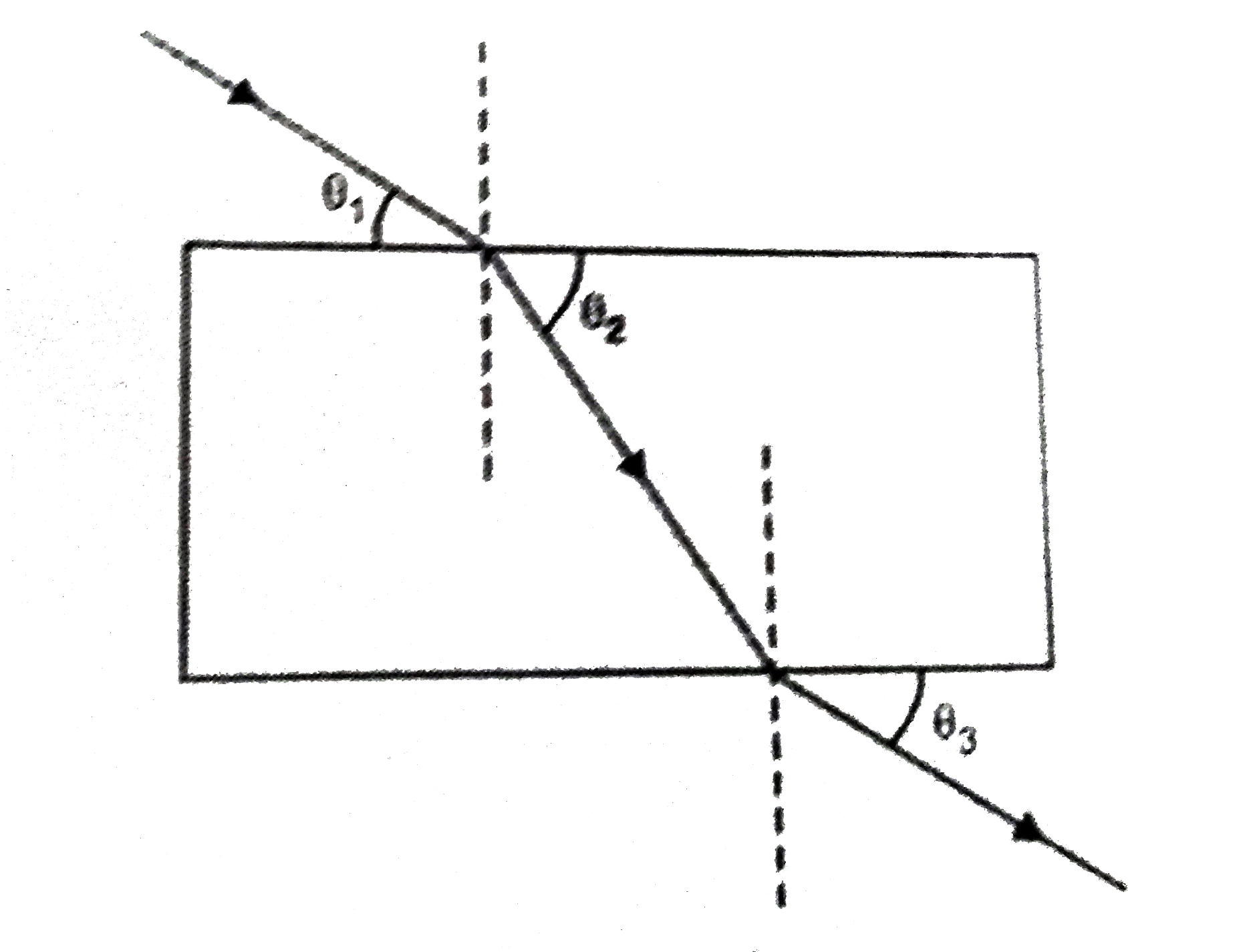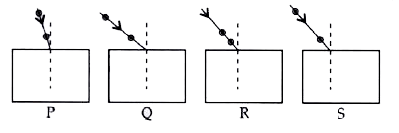A student while doing the experiment on tracing the path of a ray of light passing through a rectangular glass slab measured the three angles marked as θ1,θ2 and θ3 in the figure.
His measurements could be correct if he were to find :

θ1<θ2<θ3
θ1<θ2 but θ1=θ3
θ1>θ2>θ3
θ1>θ2 but θ2=θ3
The correct Answer is:B
NA
Topper's Solved these Questions
- THE HUMAN EYE AND THE COLOURFUL WORLD BOOK - LAKHMIR SINGH & MANJIT KAURCHAPTER - THE HUMAN EYE AND THE COLOURFUL WORLD EXERCISE - Long Answer Type Question
3 Videos
- THE HUMAN EYE AND THE COLOURFUL WORLD BOOK - LAKHMIR SINGH & MANJIT KAURCHAPTER - THE HUMAN EYE AND THE COLOURFUL WORLD EXERCISE - NCERT Book
14 Videos
- THE HUMAN EYE AND THE COLOURFUL WORLD BOOK - LAKHMIR SINGH & MANJIT KAURCHAPTER - THE HUMAN EYE AND THE COLOURFUL WORLD EXERCISE - Long Answer Type Questions
2 Videos
- TEST PAPER 4BOOK - LAKHMIR SINGH & MANJIT KAURCHAPTER - TEST PAPER 4EXERCISE - SECTION A
10 Videos
Similar Questions
Amol performed an experiment on tracing the path of a ray of light passing through a rectangular glass slab. When ray of light enters from air to glass slab, he observed ∠I=45∘. The angle of refraction must be
View SolutionA student does the experiment on tracing the path of a ray of light passing through a rectangular glass slab for different angles of incidence. He can get a correct measure of the angle of incidence and the angle of emergence by following the labelling indicated in figure :

View Solution
Knowledge Check
Select from the following the best experimental set-up for tracing the path of a ray of light passing through a rectangular glass slab:
 APBQCRDS
APBQCRDSA student traces the path of a ray of light passing through a rectangular glass. Slab.

For measuring the angle of incidence, he must position the protractor in the manner shown in figure :AABBCCDDOne student is doing experiment to draw to the path of light rays passing through a glass slab. Incidence In all the cases the found that _____
AThe angle of incidence is largest than the angle of refraction , but is almost equal to the angle of emergane .BThe angle of incidence is smaller than the angle of refraction , but is almost equal to the angle of emergenceCThe angle of incidence is largest than the angle of refraction and also it is largest than th angle of emergenceDThe angle of incidence is smaller than the angle of refraction and also it is largest than ath angle of emergence
Four students A, B, C and D showed the following traces of the path of a ray of light passing through a rectangular glass slab.
The trace most likely to be correct is that of student :

View SolutionA student suggested the following 'guidelines' to his friend for doing the experiment on tracing the path of a ray of light passing through a rectangular glass slab for three different angles of incidence :
A. Draw the 'outline' of the glass slab at three positions on the drawing sheet.
B. Draw 'normals' on the top side of these 'outlines' very near their left end.
C. Draw the incident rays on the three 'outlines' in directions making angles of 30∘,45∘,60∘ with the normals drawn.
D. Fix two pins vertically on each of these incident rays at two points nearly 1 cm apart.
E. Look for the images of the 'heads' of these pins while fixing two pins from the other side, to get the refracted rays.
When he showed these 'guidelines' to his teacher, the teacher corrected and modified the 'guidelines' labelled as
View SolutionA student performs the experiment on tracing the path of a ray of light passing through a rectangular glass slab for different angles of incidence. He measures the angle of incidence ∠i, angle of refraction ∠r and angle of emergence ∠e for all his observations. He would find that in all cases :
View SolutionIn the experiment to trace the path of a ray of light through a parallel sided glass slab, a student measured the angles of refraction for three different angles of incidence. He will find that :
View SolutionIn an experiment to trace the path of a ray of light passing through a rectangular glass slab, four students measured the angles of incidence (i), angles of refraction (r) and angles of emergence (e) as shown in the diagrams :

The correct measurement is given in the diagram :
View Solution
